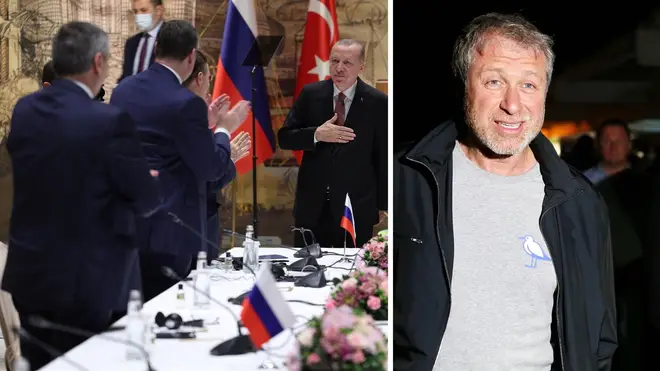
Paul Brand 10am - 12pm
29 March 2022, 09:07 | Updated: 29 March 2022, 09:37

Delegates from Russia and Ukraine meeting in Istanbul for the first face-to-face talks in more than two weeks have been warned not to eat, drink or touch any surfaces after it emerged Roman Abramovich suffered poisoning symptoms.
Abramovich last night confirmed he had been the victim of a suspected poisoning during an earlier round of talks, allegedly using chemical weapons. He was pictured at the fresh round of talks today.
Reports claimed he went blind for several hours and skin peeled off his hands and face after he ate a small amount of chocolate at earlier talks.
Two Ukrainian negotiators also suffered similar symptoms.
Read more: Ukraine's Zelenskyy believes Boris 'cares more about European peace than energy bills'
Read more: Roman Abramovich 'lost sight after poisoning' during Ukraine peace talks

Volodymyr Zelenskyy has 'evolved' since the invasion
Ukraine's foreign minister Dmytro Kuleba warned this morning that those negotiating with Russia should not eat or drink anything in the latest talks.
In an interview with the Ykpaiha 24 news channel, Mr Kuleba said: "I advise anyone going through negotiations with the Russian Federation not to eat or drink anything, and preferably avoid touching any surface."
It comes as discussions between Ukrainian and Russian delegations are set to continue in Turkey on Tuesday.
Government minister Will Quince said today that the alleged poisoning of Mr Abramovich and Ukrainian negotiators is a "worrying development".
He said the UK would be looking to "establish the facts" around the claims.
The discussions between Ukrainian and Russian delegations come as the fighting appeared to have reached a stalemate, with the two sides trading control of a town in the east and a suburb of the capital.
Ukrainian forces retook Irpin, north west of Kyiv, from Russian troops, who were regrouping to take the area back, President Volodymyr Zelenskyy said on Monday as he sought to rally the country.
"We still have to fight, we have to endure," Mr Zelensky said in his night-time video address to the nation. "We can't express our emotions now. We can't raise expectations, simply so that we don't burn out."
Ahead of the talks in Istanbul, the Ukrainian president said his country is prepared to declare its neutrality, as Moscow has demanded, in comments that might lend momentum to negotiations.
Mr Zelenskyy said over the weekend that compromise might be possible over "the complex issue of Donbas", the hotly contested region in the country's east.
It is unclear how that might be reconciled with his stance that "Ukraine's sovereignty and territorial integrity are beyond doubt".
Russia has demanded that Ukraine drop any hope of joining Nato, which Moscow sees as a threat.
Mr Zelenskyy has stressed that Ukraine needs security guarantees of its own as part of any deal.
As fighting raged throughout the country, the mayor of Irpin, which has been the scene of some of the heaviest fighting, said the city had been "liberated" from Russian forces.
A senior US defence official said the US believes the Ukrainians have also retaken the town of Trostyanets, south of Sumy, in the east.
The official said Russian forces largely remained in defensive positions near the capital, Kyiv, and were making little forward progress elsewhere in the country.
The official said Russia appeared to be de-emphasising ground operations near Kyiv and concentrating more on the Donbas, the predominantly Russian-speaking region where Moscow-backed rebels have been waging a separatist war for eight years.
Late last week, with its forces bogged down in parts of the country, Russia seemed to scale back its war aims, saying its main goal was gaining control of the Donbas.
The possible face-saving exit strategy for Russian President Vladimir Putin has raised Ukrainian fears the Kremlin aims to split the country, forcing it to surrender a swathe of its territory.